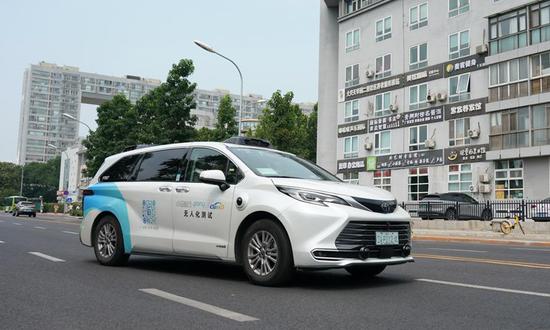China commerce chamber slams U.S. rules on Chinese connected cars, autonomous driving technologies
The China Chamber of Commerce for Import and Export of Machinery and Electronic Products (CCCME) expressed strong opposition on Thursday to the Biden administration's decision to ban the sale and import of integrated hardware and software for connected cars from specific countries, including China. This includes the prohibition of vehicle communication systems (VCS) and autonomous driving systems (ADS) software integrated into vehicles.
In a statement posted on its WeChat account, the CCCME criticized the U.S. for ignoring the majority of reasonable assessments and UN rules, and continuing to implement stringent measures targeting specific nations.
The chamber argued that these actions contradict the current trend of international cooperation, hinder technological progress and undermine the creation of a secure, transparent and globally compliant framework.
The restrictions, the CCCME said, not only jeopardize the global automotive supply chain but also harm consumer interests worldwide.
The chamber emphasized that the security of connected vehicle technologies should be based on UN standards, particularly under the UN R155 and UN R156 documents, which focus on compliance, transparency and verifiability. It accused the Biden administration of exploiting national security concerns under the guise of information security to suppress products and technologies from specific countries.
According to the CCCME, this approach is aimed at achieving technological dominance, to the detriment of the global automotive industry and the safety of the international supply chains.
Both VCS and ADS belong to the category of information and communication technology (ICT) products and are subject to stringent regulations across countries. The CCCME stressed that widespread international cooperation and mutual recognition of agreements are essential for building a global industrial system in the sector.
The chamber said that the U.S. government's unilateral policies are likely to cut off technological cooperation and information exchanges with specific countries, which could not only fail to ensure absolute security but also exclude the U.S. from cutting-edge connected car technology, ultimately impeding its own technological development.
Connected vehicle technology, which enables communication between vehicles and the infrastructure, is designed to enhance road safety, reduce traffic accidents, alleviate congestion and improve transport efficiency. The CCCME argued that the Biden administration is prioritizing self-interest over industry development and is undermining confidence in the growth of domestic smart connected cars and autonomous driving technologies. This will slow technological progress, increase costs, and, ultimately, harm consumers.
The chamber pointed out that the creation, storage and communication of vehicle data, driven by ICT, is already affected by an international consensus on security measures. A global regulatory framework is being established, and continued cooperation among nations is crucial for ensuring compliance.
The CCCME suggested that concerns raised by the Biden administration should be addressed through dialogues and collaborations between countries, rather than through bans on imports and trade.
Given these concerns, the CCCME called on the Biden administration to abandon Cold War thinking and align itself with the global development of VCS and ADS technologies. The chamber urged the U.S. to improve the global regulatory framework, enhance data security, and collaborate toward the shared goals of increasing road safety, reducing accidents, alleviating congestion and boosting transport efficiency.
In addition to the CCCME, several industry associations, including the China Association of Automobile Manufacturers and the China Semiconductor Industry Association, have voiced strong opposition to the Biden administration's recent imposition of intensive trade restrictions against China's tech sector.
On Thursday, Guo Jiakun, a spokesperson for the Chinese Foreign Ministry, condemned the U.S. actions as a typical act of economic coercion and hegemonic bullying, expressing strong dissatisfaction and resolute opposition to the increased restrictions on these measures.

